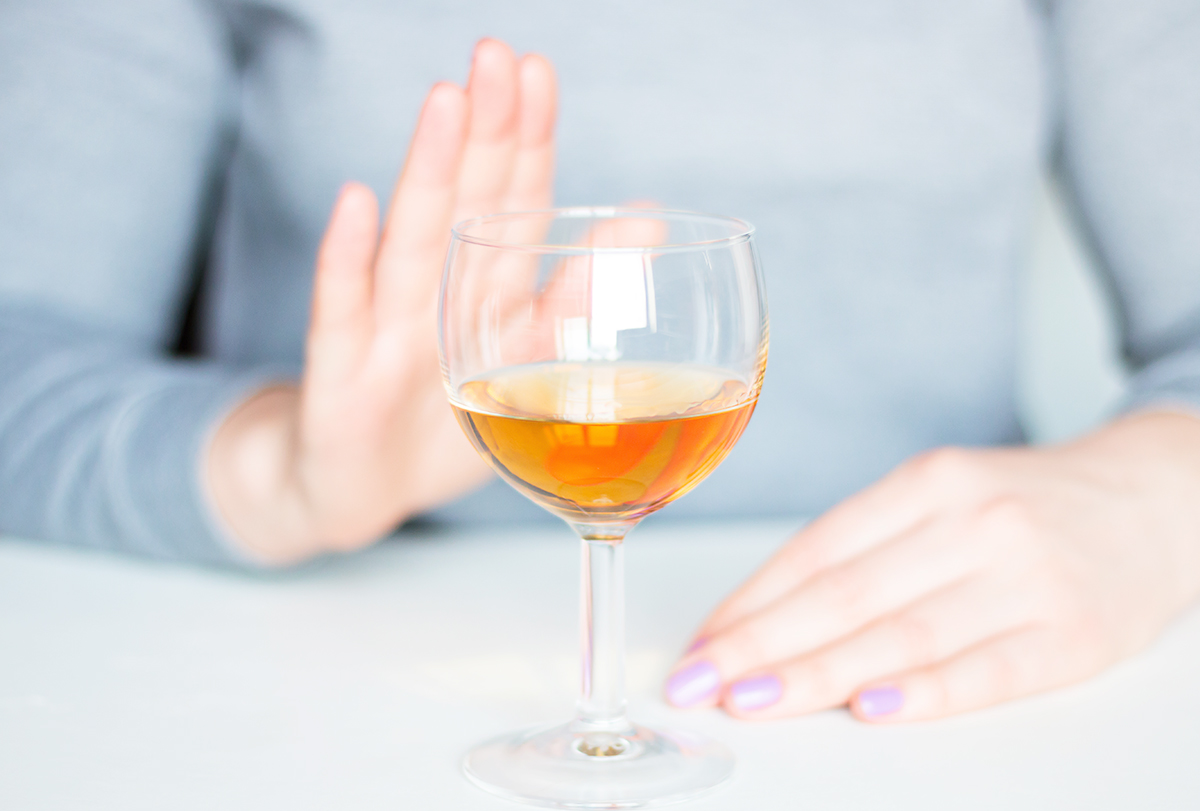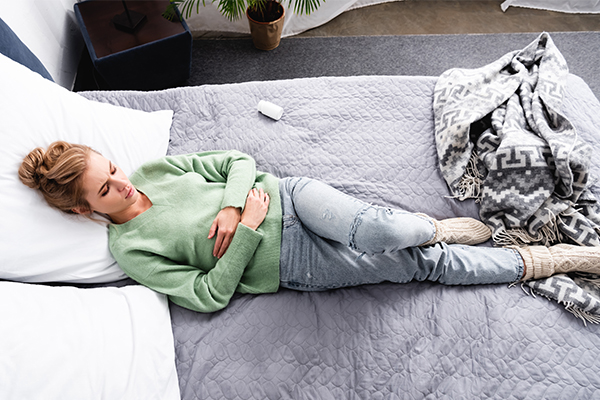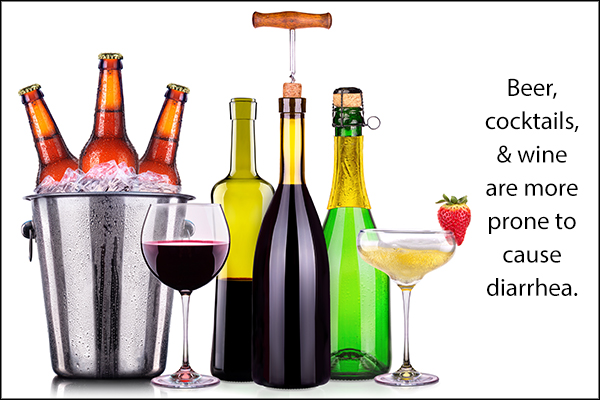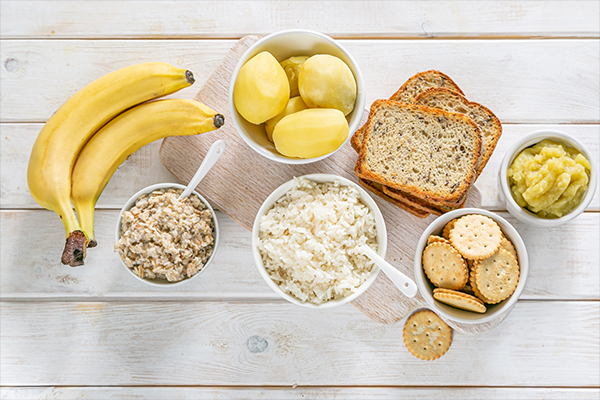In this article:
Drinking alcohol is a common activity throughout the world that is associated with side effects. The effects of alcohol ingestion can vary, ranging from coordination impairment to gastrointestinal distress.

Alcohol is easily absorbed into many tissues in the body, leading to its side effects. Diarrhea can be an uncomfortable result of ingesting alcohol and is associated with other side effects.
What Causes Diarrhea After Consuming Alcohol?
If there is food in the stomach at the time of drinking alcohol, the absorption rate will slow. This is why people feel the effects of alcohol more quickly on an empty stomach.
Alcohol is absorbed by simple diffusion in the stomach and, to a lesser degree, in the small intestine. Alcohol interferes with the large intestine’s ability to absorb water, which results in the stool becoming runny.
Ethanol, which is the common type of alcohol people drink, can often irritate the gastrointestinal tract and produce inflammation of the tract. This irritation and inflammation are caused by alcohol’s ability to produce more gastric acid. Beer and wine often have this effect, which can lead to diarrhea.
Different Types of Alcohol Ingestion

Alcohol-induced diarrhea can be of two types:
1. Acute alcohol ingestion
Acute alcohol ingestion causes mucosal erosions and villous-predominant epithelial loss (the intestinal mucosa and villi are responsible for absorption), so more diarrhea will take place as well as malnutrition.
2. Chronic alcohol ingestion
The effects of chronic alcohol ingestion on the intestinal mucosa are not well understood but may include fibrous tissue accumulation.
Chronic alcohol ingestion reduces nutrient absorption, which, along with bacterial overgrowth, increased intestinal permeability, and altered intestinal motility, contributes to malnutrition and diarrhea.
People Who Are Prone to Alcohol-Induced Diarrhea
People with the following conditions are more at risk of experiencing diarrhea from alcohol use:
- Irritable bowel syndrome
- Crohn’s disease
- Other gastrointestinal diseases
- Certain food allergies such as gluten intolerance
- Habits such as chronic alcohol ingestion or binge drinking can increase the likelihood of experiencing diarrhea
- Eating heavy foods while drinking can lead to diarrhea due to the body’s inability to digest and breakdown food properly
Alcohols That Commonly Cause Diarrhea

The following alcohols are more likely to cause diarrhea than others:
1. Beer
Beer is loaded with carbohydrates, which is why it can be harder to digest than other lighter alcoholic beverages. Your stomach may fail to breakdown all the carbs present in beer.
These undigested carbs will then pass into the large intestine, where the colon bacteria will try to convert them into energy. This bacterial breakdown of the carbs tends to trigger gas, bloating, and diarrhea.
2. Sugary drinks like cocktails
Sugary drinks like cocktails also have high carbohydrate content, which can be heavy on the digestive system and can lead to diarrhea.
3. Wine
Wine often triggers diarrhea in people who are allergic to tannins, which are antioxidant compounds found in the skin of grapes.
Treating Alcohol-Induced Diarrhea

Here are a few home therapies and lifestyle changes to manage diarrhea brought on by alcohol:
- If you are experiencing alcohol-induced diarrhea, it is best to eat easily digestible foods such as rice, bananas, and toast.
- Use an antidiarrheal, such as Imodium, to reduce the severity and frequency of loose motions.
- You need to replenish your lost fluids by drinking lots of water, juices, broth, and herbal teas to avoid dehydration.
- Don’t consume anything that could worsen your symptoms, usual culprits being dairy, caffeine, or foods that are high in fiber, fat, or spice.
Preventing Alcohol-Related Diarrhea
Here’s how you can avoid diarrhea triggered by alcohol consumption:
- The best way to prevent alcohol-associated diarrhea would be to abstain from drinking altogether or to moderate alcohol ingestion.
- If you can’t give up alcohol altogether, at least limit or avoid sugary or carb-laden drinks such as beer, cocktails, and wine that usually cause diarrhea.
- Eat a balanced meal before drinking to slow the absorption of alcohol in the body.
- Alternate between alcohol and water while drinking to maintain a proper fluid balance inside the body and reduce the risk of diarrhea thereafter.
Complications Associated With Alcohol Ingestion
People who experience prolonged or frequent diarrhea on account of their alcohol intake are at an increased risk of the following complications:
1. Dehydration
Continued diarrhea can lead to dehydration, which in turn can lead to multi-organ dysfunction throughout the body if severe enough.
2. Malnutrition
Both acute and chronic alcohol consumption can cause malnutrition by decreasing dietary caloric intake, impairing nutrient digestion and absorption, decreasing protein synthesis and secretion, increasing breakdown of gut proteins, and increasing breakdown and excretion of nutrients.
The degree of malnutrition depends on the amount of alcohol consumed, the quality of food intake, genetics, and the presence and severity of comorbid illnesses such as diabetes.
The risk of developing micro- and macronutrient deficiencies increases significantly when alcohol makes up more than 30% of the total caloric intake. (1) The caloric content of an alcoholic beverage comprises calories from both alcohol (7.1 kcal/gram alcohol) and its non-alcohol components. (2)
When to See a Doctor

Professional assistance and consultation by visiting a medical professional should be sought when diarrhea is persistent for 2 days or after all at-home therapies have been tried.
You should visit a medical professional if there is:
- Pain in the rectal or abdominal area
- Fever above 102˚F (39˚C)
- Dark or bloody diarrhea
- Fatigue
- Light-headedness
- Diarrhea for more than 2 days without any improvement
Final Word
If you experience diarrhea after drinking alcohol on a regular basis, then you might want to rethink your drinking habits and possibly eliminate alcohol altogether, especially if you fall into the high-risk category for experiencing diarrhea after alcohol use.
In most cases of diarrhea caused by drinking, the symptoms will go away once the person returns to a normal diet and stops drinking alcohol.
- Was this article helpful?
- YES, THANKS!NOT REALLY


